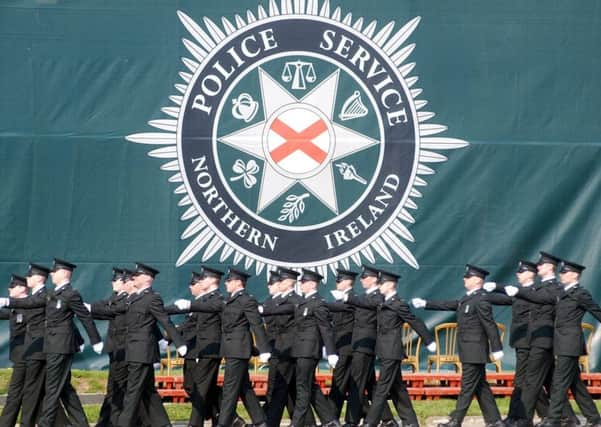Cut in PSNI drill lessons '˜more relevant' to modern policing


Alan McQuillan said a reduction in drill lessons during basic training – from 17.5 hours down to 10.5 – reflects a more modern approach to policing and should not affect standards of discipline or turnout.
At the time of the Patten recommendations in 1999, RUC recruits spent more than 40 hours on drill lessons, as well as marching between the locations of training classes.
Advertisement
Hide AdAdvertisement
Hide AdStudent officers at the PSNI training college in Belfast no longer march between classes, and the latest reduction in drill practice means the lessons will only take place in the final five weeks of the 23-week course.
Mr McQuillan said that, in the modern era, it is more appropriate for the officers’ demeanour and standard of dress to be continually assessed throughout the training period.
“I think we have moved away from a more military style of policing – not just here but across the UK,” he said.
“There are much bigger priorities in terms of how officers engage with the public, how they do things, how they investigate crime and how they record statements are all much more important than drill.
Advertisement
Hide AdAdvertisement
Hide Ad“It’s sad to say that once you were trained in the RUC the only time you used the skills you got through drill was at funerals. Thank God there are far fewer of those now, so I think it won’t be missed.”
Mr McQuillan added: “There is a difference between turnout and drill. Turnout is about how they present themselves and how they behave, and that can be judged all of the time in the classroom – not just in terms of being on a parade square. When I did it, it was for one hour each day for four days a week or something like that. It then built up to a couple of hours towards the end of the training, which was a significant amount of time.”
Head of the police college, Chief Superintendent Phil Knox, said a review of police training in 2016 recommended a reduction in marching.
“The practice of students marching to and from class was removed entirely from the college,” he said.
Advertisement
Hide AdAdvertisement
Hide Ad“The Police Service of Northern Ireland are continually striving to improve the student officer training programme to ensure it aligns with strategic priorities, reflects our organisational values, is operationally relevant and best meets the learning needs of student officers. In line with changes in policing demand, priorities and risk, college staff continually review content and delivery methods to ensure currency and best practice.”
• The Patten report in 1999 highlighted the lack of human rights training compared to the number of drill lessons at that time.
It said: “Human rights training in the RUC also lags behind other police organisations. In the new curriculum ... of 700 sessions of training there are only two sessions dedicated to human rights, compared with 40 of drill and 63 of firearms training”.